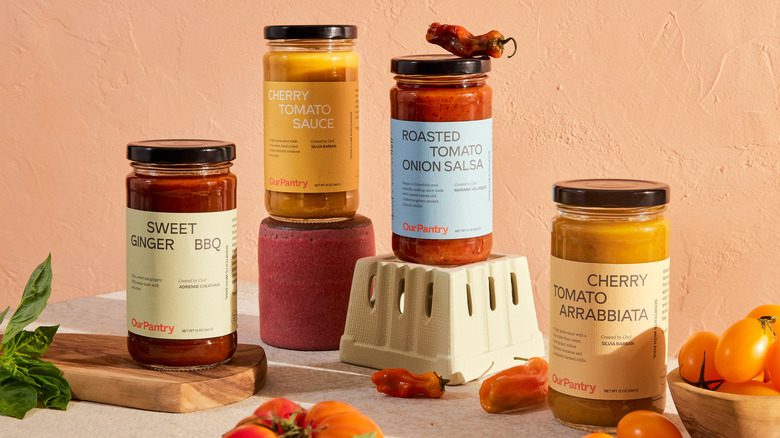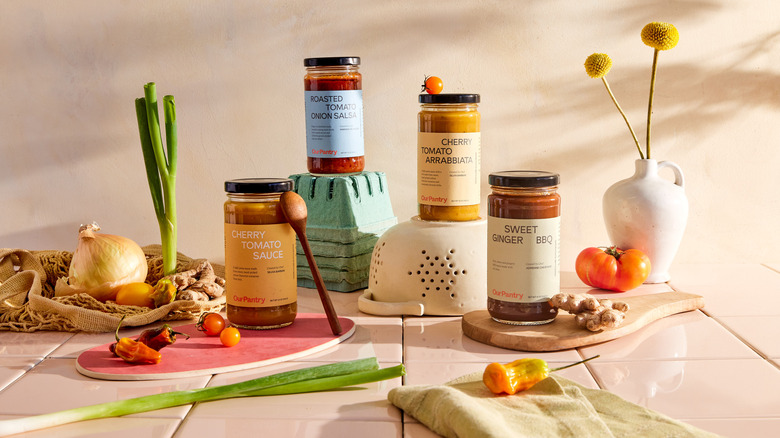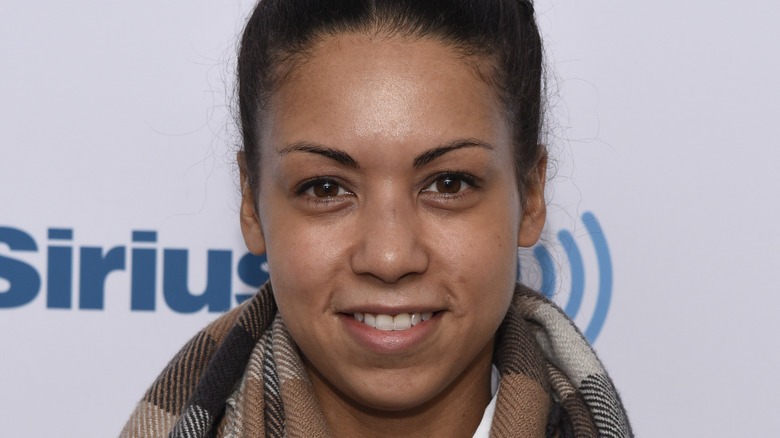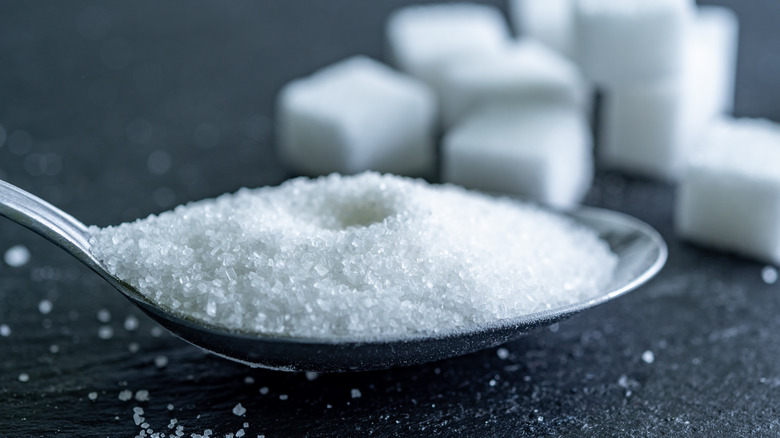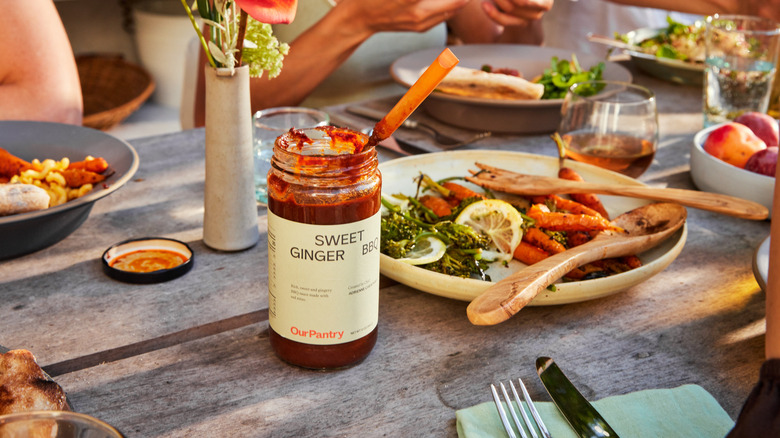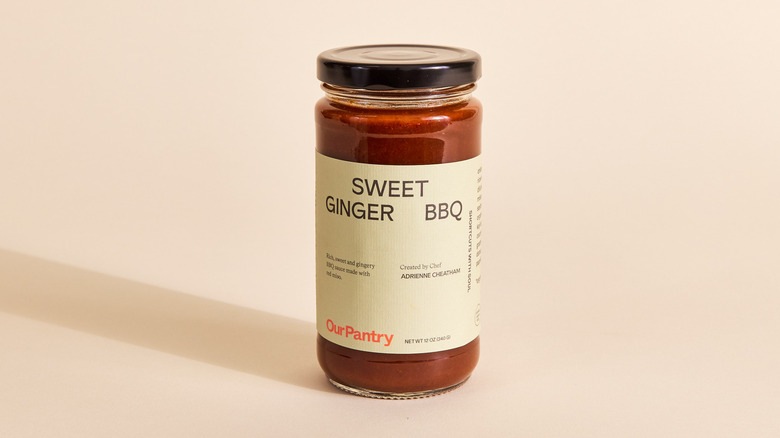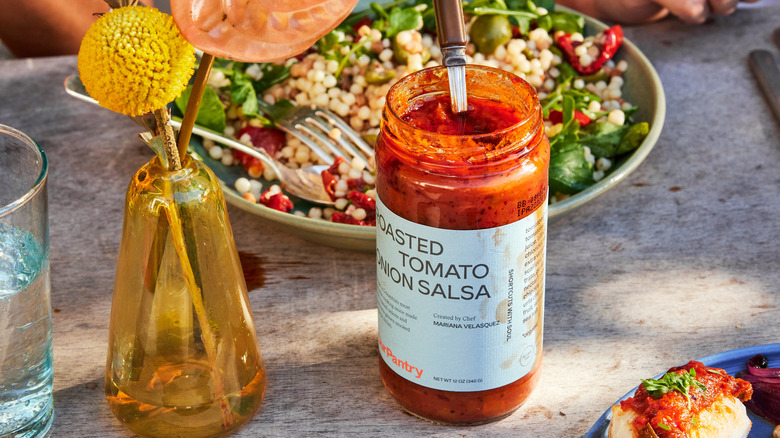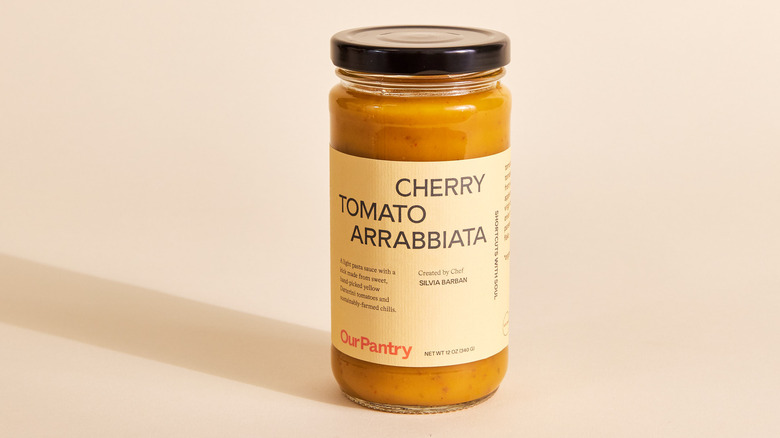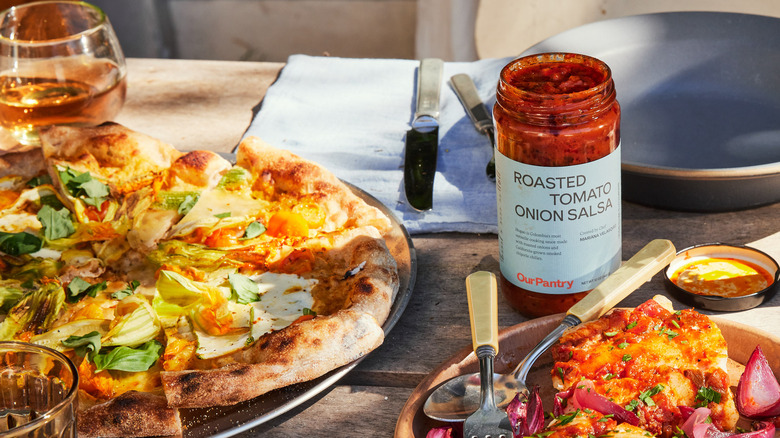Adrienne Cheatham And Carolyna De Laurentiis Of Our Pantry On Their Premium Sauces - Exclusive Interview
When the pandemic hit, Carolyna De Laurentiis found herself in a space many working parents find themselves, trying to feed her family good, nutritious meals while keeping up with everything else. To save time, De Laurentiis reached for jarred sauces, but she never felt good about it. The sauces she found were full of added ingredients and just didn't have that scratch-made taste. As a business professional, she saw a hole in the market and knew it was possible to make a better product — and if no one else was going to make it, she would do it herself. So she founded Our Pantry, a woman-owned company making premium sauces with traceable ingredients.
To create the best possible line, De Laurentiis teamed up with top professional chefs, tapping talents such as Adrienne Cheatham. Cheatham is a renowned chef, having worked in Michelin-starred restaurants such as Eric Ripert's Le Bernardin and coming in runner-up on "Top Chef." Together with two other chefs, Silvia Barban and Mariana Velasquez, they created a lineup of four products: Sweet Ginger BBQ, Cherry Tomato Sauce, Roasted Tomato Onion Salsa, and Cherry Tomato Arrabbiata. We sat down with Carolyna De Laurentiis and Adrienne Cheatham to discuss their new line of products and how they hope to transform home cooking.
Our Pantry principles
I wanted to start off by asking what the impetus for starting Our Pantry was.
Carolyna De Laurentiis: I founded Our Pantry in collaboration with some really wonderful chefs I'm excited to talk to you more about. I, in the middle of the pandemic, was a new mom, was frustrated by my options that were available to me [in] the aisle[s] of the supermarkets. I was cooking a lot from home but looking for shortcuts in the kitchen that would help me save time and be there for my family. But as I looked at the options that were available, I always wondered who was behind the products on the shelves. I wanted to know who the chef was behind the recipe, and I wanted to understand where the ingredients were coming from. So I decided to partner with Adrienne, Sylvia, and Mariana on creating a line of sauces that are all made with traceable ingredients.
How do you source your ingredients?
De Laurentiis: It's a process that we work with our chefs and our manufacturer on. Depending on each formula, we identify what the key ingredients need to be for flavor, and then we scour the U.S. and the world to find suppliers that align with our 100% traceable mission. [We value] being able to commit to country-of-origin tracing, first and foremost, so that we can identify exactly where the ingredient comes from, which we think is important in helping us to establish carbon neutralities, since we know how to calculate our carbon footprint. It also gives us visibility [of] who the manufacturer of that product is and allows us to vet them a little further to make sure that they align with our values [and] are taking some steps to be conscientious about their impact on the environment and on the growing practice, to make sure that the products themselves are as delicious as possible.
That's the framework. Then we work with our chefs and our manufacturer to make sure that [the] product is available in the quantities that we need it and that we can get it to Florida. We are trying to also source as many of our ingredients as possible from the U.S. to try to reduce the amount that we are importing. But as you know, many spice suppliers and specialty ingredients come from all over the world, and our products really showcase a global cuisine, so we need to source and import where appropriate.
How did you develop the flavor lineup that you're offering?
De Laurentiis: The largest sauce categories in the United States based on consumer preference [are] tomato sauce, salsa, and barbecue. Those are the largest categories. As I was looking at that from a market share perspective, [I] started looking for chefs who could create their own spin on those products. When Adrienne and I first chatted, she mentioned ... she was really excited about this recipe that she had already had in her cookbook for the sweet ginger barbecue, and that was the broad framework for how the specifics came to be.
Chef partnership
How did you decide which chefs you wanted to work with?
De Laurentiis: I was looking for chefs that were true experts in their categories, that had a real vision for elevated, delicious cuisine that we could then bring to the average home cook's pantry. And [I was] looking for chefs who could help us tell that story, who were digitally affluent and available so we could create beautiful content with them to showcase both how the products are made and the transparency behind our process, [and] how to then cook with it.
Adrienne, what made you want to work with Our Pantry and Carolyna?
Adrienne Cheatham: One of the things I was most excited about was I looked at doing a couple of direct-to-consumer products before, and the companies that I was approached by weren't really caring about sourcing. They didn't care if the items are grown organically or if they're sprayed with tons of pesticides and stripped the earth of all the nutrients without any type of planting that gives nitrogen back to the soil that we're taking these resources from. That was something that Carolyna said was very important to her, making sure that the ingredients were fully traceable.
[With] some of the sauces we talked about, some of the recipes, if there was [an] ingredient that we couldn't get because it wasn't traceable, it was like, "Okay, well, let's do something different," because it wasn't worth the risk of deviating from the mission just for one ingredient. And if that ingredient is going to make or break the sauce, then let's do a different sauce. That was the most important factor, working with people who care about what they're doing, who care about where things come from, and finding people who are doing things the right way. That was the largest impetus right there.
What not to expect
Are there any ingredients that either of you refuse to have in any of the products?
Cheatham: Refined sugars were a hard no for both of us.
De Laurentiis: We're trying to avoid refined sugar in the barbecue, for sure. Overall, we're not adding any extra artificial flavors in any of the products, and we're not adding any extra artificial preservatives. Actually, none of our products today have any added preservatives, other than vinegar and lemon juice, which are natural preserving agents. There's a world where citric acid, which actually is vitamin C, could be used in the future, but it is something that we're trying to be conscientious of and trying to use lemon juice and vinegars and natural agents as much as possible, because that's what you would expect to find in your pantry anyways. We're trying to be thoughtful about those products.
Cheatham: As a chef, I actually have tons of citric acid in my pantry, but I don't expect that most people do.
De Laurentiis: It is just vitamin C, so it is a natural preserving agent, technically, but I think there's a little bit of consumer [hesitation].
Cheatham: And to be used commercially as a preservative — I think it's much better, like you said, Carolyna, that there's vinegar in the recipe, so why do we need to add additional preservatives when we already have the preserving agent naturally?
De Laurentiis: Right. I'm not saying that we wouldn't ever consider using citric acid. Certain formulas require it. If you're making a product that doesn't have a natural acidity to the flavor, you might need it to stabilize it, but we are trying to be as conscientious as possible about what extra inputs we're adding.
Restaurant-quality sauce
Adrienne, how did working in a restaurant such as Le Bernardin influence the creation of these sauces?
Cheatham: That was a huge part of my career. I was there for eight years. I was exec sous, so I worked the sauce station for years on end, tasted the sauces every day. One of the things that I loved most about working there and working with Chef Ripert was that he would bring in ingredients [from] his travels and say, "Hey, let's incorporate this somehow." So one of the first sauces, actually, that I put on the menu at Le Bernardin was a white miso sauce with bacon and shallots. I actually have a version of that in the cookbook also with a sweet potato gnocchi.
I became obsessed with the texture of miso, and [it was] the first thing I noticed because we tasted tons of different misos when he got back from this trip to Korea. At this point, it was probably 12, 13 years ago, and I was obsessed with the red miso. I thought it was the coolest thing. It almost looked like tomato paste. That's where I kept asking the question, "Can I toast it in a pan like when you add tomato paste to the foundation for a braise or for a sauce? Why can't I do that with miso?" It was something I always played with, and I loved how global ingredients and ingredients from different cultures lend themselves so well to different things. You have to play with it to realize how much they have in common.
Would you say that these sauces are something that would be used in a restaurant setting or of that quality?
Cheatham: Definitely. They can be used as a base, or they can be used as the finished product. So you can love up on it if you want to, or you can use it as is, straight out of a jar, whereas [with] a lot of things in restaurants, you have to make them a component of something else. This can help cut down some of that prep work ahead of time by giving you something that can be the finished product.
Recipe development
How is developing a recipe for a jar different than developing one for, say, a cookbook or a restaurant?
Cheatham: It's very different because it's not going to be eaten immediately. The process of jarring does preserve it right [at] that moment that it's made, but it does have to be a little bit different to be shelf stable. At home and in restaurants, I don't measure anything. So the hardest thing was I put the recipe for the red miso barbecue sauce in my cookbook, but that was a little bit different. We did want to tweak it a little bit more for this company and for this product, so for that, it was careful measuring. Carolyna came over once or twice, and we did different recipe testing days and tried different iterations of it, playing with the amount of ginger, the amount of miso, the amount of coconut sugar, or rice vinegar. It was a really cool process, but that was probably the most difficult. It was like, "No, it doesn't just need two tablespoons. It needs two tablespoons plus half a teaspoon."
What is one ingredient that you can't live without in the kitchen?
Cheatham: I feel like salt is obvious because there's no world in which I could cook without salt. It makes you taste everything so much better. I worked in pastry for a bit, and even the pastry chef said, [for] every recipe, if it doesn't have salt in the recipe already, always add a pinch of salt. And it's true. ... It's true from a chemical standpoint for what it does to doughs and batters, but also flavor-wise, it opens everything else up.
Melding professional passions
Carolyna, your background is in business. You worked for companies outside of the food realm. What made you want to enter the food market?
De Laurentiis: I actually started my career in hospitality. When I was in college at university in Philadelphia, and then I moved to New York after school, I worked for Starr Restaurants and BR Guest Restaurants as a restaurant manager and then later as a marketing manager for the corporate teams. There is where I had my first taste of collaborating and working with chefs. Ivy Stark, who's at Dos Caminos, inspired this love of culinary collaboration.
When I got that taste of having collaborated with chefs while I was on the corporate side, and then I went to business school and worked for direct-to-consumer wellness companies in the personal care space, Beautycounter, Ritual, I always had this hankering to get back to food. Actually, my grandmother had a pasta manufacturing plant in Naples, Italy, so food [has] always run core to my family and to me, personally. I wanted to take what I had learned from the personal care space, being very thoughtful about ingredient sourcing and about the impact of the products that we use on our bodies and the planet, and apply that to the category that I felt most passionate about and I felt a direct need for as a consumer.
Motherhood
As a mom, you said on your website that using pre-made sauces sometimes felt like cheating. How is Our Pantry different in that respect?
De Laurentiis: We're trying to celebrate the shortcut. I felt that when I would reach for a sauce from my pantry, or I spoke to lots of friends and potential customers about this, and everybody felt like anytime they'd reach for a sauce from their pantry, it was like they were doing it to save time because they hadn't gotten it together to make something from scratch. But they never felt great about it for whatever reason. Maybe it was the product itself, or maybe it was the act of having taken the easy way out.
We felt like, as a brand, that was a massive opportunity to give people the confidence to actually say, "Look, my wellness and my time and everything else is more important to me, so I'm going to be excited about reaching for this sauce [from] my pantry because I know it was made by a top-tier chef, so the quality and ingredients and the flavor [are] going to be on point. And I'm going to trust that this brand did the hard work and heavy lifting to find ingredients that would be good for me and that I could trust." That's the ultimate goal, to help people feel like they can celebrate taking a shortcut in the kitchen and trust that the meal and every step leading up to it was something to feel excited and happy about.
Price and the future
Right now, the price per jar is not cheap. What is the added value that people get when they put the extra money in for Our Pantry?
De Laurentiis: It's something that we are extremely aware of. I wanted to make this price point as accessible as possible, but when you're producing as a startup, at a smaller volume in the beginning, and you're taking the steps to find these ingredients that are going to be priced a little bit more at a premium, there is no way around the pricing. We want people to feel confident that it's priced that way not to take advantage of their wallets but because we're putting a lot of intention into the products that we're making, and it represents the value chain that has enabled it to come to market.
Ultimately, the goal is to try to make these products a little more price accessible as we can scale up, but we'll have to evaluate and see. What people can take away is that if they want to go out to a restaurant and spend whatever it is, 16, 20 dollars on a dish of pasta, why not save a little and actually make that at home? The idea is, even though they are priced a little bit at a premium, they're going to be saving money no matter what, because they're not going out to eat or getting takeout and paying for delivery fees. I think there is an opportunity to position the products as alternatives to dining out and a step above what the average sauce product might be providing.
Where can someone purchase your lines of sauces?
De Laurentiis: On OurPantry.com. We are actually now rolling out a partnership with Great Jones, so our sampler will also be available on the Great Jones website. That is hot off the press today. We're actually working on that product listing, and we're working now to develop relationships with retailers. By the time this comes out, we might be in a couple stores in New York, so I'll keep you posted.
Is there any plan to expand the lineup eventually?
De Laurentiis: Yes. We have a couple chef partners in the pipeline that we're working on products with. We want to nail the launch and the marketing of our first four products, so we're going to wait to announce any new products and timing for a little bit.
Our Pantry's full line of sauces is now available for sale from OurPantry.com.
This interview has been edited for clarity.
